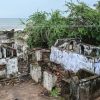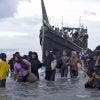
With the recent flash floods and cyclone hitting our Paradise Island, questions arise whether we are prepared for bigger calamities that will come our way. Water accumulation on roads, inundated schools and houses caused a lot of upheavals nationwide. Do we have poor infrastructure or is it mismanagement?
Publicité
Manoubhavna Koonja : “Emergency services were flabbergasted”
 In the recent past, the frequency and intensity of these emergencies have increased, possibly as a result of global climate change and this represents an increasing danger to the social development of the country, says Manoubhavna.
In the recent past, the frequency and intensity of these emergencies have increased, possibly as a result of global climate change and this represents an increasing danger to the social development of the country, says Manoubhavna.
“According to the IPS, Mauritius may be one of the best-prepared countries in the world when it comes to cyclones, but heavy rains and flooding have brought the country to its knees. Flashback to March 30th in 2013, when floods devastated Port-Louis. Eleven persons died, a hundred were wounded and millions of rupees were lost as buildings, roads, vehicles, shops and houses incurred damages. Emergency services were flabbergasted and unable to provide effective response to the disaster. The country does not have a well-maintained drain to carry the rainwater to the sea and instead, they are blocked by construction waste.”
She further explains, “The Island is developing an early warning system that will give three days notice of possible storm surges and improving its capacity to evacuate people from vulnerable areas. But any calamity is beyond human control and according to the latest World Risk Report, Mauritius is classified as the country with the 13th highest disaster risk and is the seventh most exposed to natural hazards.”
Pavan Gopal : “Poor road network”
 Pavan Gopal believes that Mauritius is not well prepared to face any severe natural calamity or catastrophe on various levels, be it structurally and organisational-wise.
Pavan Gopal believes that Mauritius is not well prepared to face any severe natural calamity or catastrophe on various levels, be it structurally and organisational-wise.
“The first major stumble that we face as a nation in front of a natural disaster is our poor road network that hampers an effective evacuation plan for regions under threat. The problem does not only rest with evacuating people but also evacuating water. Flooding is a common occurrence during cyclones leading to poor hygiene, drowning, car accidents and many other problems. Ineffective planning and responses to such serious issues have turned into recurring situations today.”
He further adds that “another major stumble is in regards to the basic provision of potable water and electricity to houses during an extreme weather condition. Ensuring that the current infrastructures can withhold bad weather should be a must but unfortunately, this is not the case in Mauritius where frequent power cuts and blackouts happen almost regularly during intense cyclones.
Refuge and rescue centres could be qualified as a liability for us, especially if we consider recent events. Our country will not be able to offer an efficient disaster management system if the simple basics are not met. It would have been a simple stock-take exercise to know the capacity of each centre and to allocate them with adequate resources such as make-shift beds. During past cyclones, there have been immense structural disturbances, which keep being forgotten by governmental institutions. We should be ready to learn from the past rather than letting the same mistakes happen over and over again.”
Aroulen Kistnasamy : “Illegal construction and waste dumping”
 It is sad to note that our drains in Mauritius are not designed and constructed according to established norms and standards, says Aroulen. “The sizing and location of our surface water drains are nowadays restricted to existing built structures. Had our building regulations and authorities which enforce these guidelines been more stringent, we would not have been in this deadlock situation today. Building permits have been given on historically ‘flood-prone’ land.”
It is sad to note that our drains in Mauritius are not designed and constructed according to established norms and standards, says Aroulen. “The sizing and location of our surface water drains are nowadays restricted to existing built structures. Had our building regulations and authorities which enforce these guidelines been more stringent, we would not have been in this deadlock situation today. Building permits have been given on historically ‘flood-prone’ land.”
He states that the primary rule to avoid flooding is to make sure that the catchment area of the drain being designed is not underestimated.
“The situation is worsened furthermore by human activities such as illegal construction and waste dumping and changes in climatic conditions. The whole drainage system in Mauritius will have to be re-assessed and re-engineered. Besides, there is need to set up an ad hoc national coordinating committee to assess the implications and establish leadership. Set up a monitoring system in each district and report to the national coordinating committee. Start a mass mobilisation campaign with public education programmes and organise a volunteer effort to join the national campaign.”
Jashveersingh Hurday : “We lack expertise”
 With frequent floods and loss of lives, we can affirm that our country is not prepared to face any big calamity, highlights Jashveersingh.
With frequent floods and loss of lives, we can affirm that our country is not prepared to face any big calamity, highlights Jashveersingh.
“Simulation exercises on a regular basis are done to identify deficiencies in case of a Tsunami or other calamities. The reports are often satisfactory, but in reality, when a calamity strikes the country, there is a panic and the population suffers from its damage.
With climate change, Mauritius will witness more perilous catastrophes in future and it is high time for us to consider what will happen if a huge calamity hits us. We now lack the expertise, but we can at least improve our logistics to minimize damages. Let’s persuade every Mauritian to prepare a survival kit and be equipped to deal with such calamities.”

Notre service WhatsApp. Vous êtes témoins d`un événement d`actualité ou d`une scène insolite? Envoyez-nous vos photos ou vidéos sur le 5 259 82 00 !


















![[Explik Ou Ka thématique PART 2] - Achats de fin d'année : Comment éviter les mauvaises surprises ?](https://defimedia.info/sites/default/files/styles/square_thumbnail/public/eok_201224_0.jpg?itok=MwpRjlhh)
![[Explik Ou Ka thématique PART 1] - Achats de fin d'année : Comment éviter les mauvaises surprises ?](https://defimedia.info/sites/default/files/styles/square_thumbnail/public/eok_201224.jpg?itok=YM_k6HPD)

